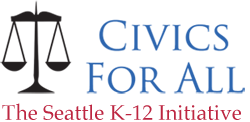For Teachers
About Teachers
- Building on current strengths and successes. Seattle school district teachers are the most important group in making the Civics for All proposal successful. Many already infuse civics lessons far beyond current requirements. Given the opportunity, with our amazing students, and our civic support network, Seattle’s superb teaching corps could easily turn the city into a civics-education model for the nation.
- Teacher-friendly and student-centered. The proposal is minimally prescriptive and gives teachers options for infusing civics into their current or new units. At the most basic level, students love civics lessons and political debates and when this passion is enkindled students succeed as scholars and as citizens. When students succeed, teachers succeed. Teacher agency, or efficacy, which has been battered since 2000, increases dramatically when student achievement increases.
- Teacher buy-in. Local and national education experts realize that successful education initiatives must cultivate buy-in by teachers, collaboration with colleagues, and respect for traditional course-work. Civics for All has received excellent buy-in from high school social studies teachers and others so far and is now working with the SEA (Seattle Education Association) to conduct a District wide awareness campaign and survey about Civics for All later this spring. Teacher support for the initiative is essential to providing the very best citizenship education possible for all of our students.
- Addressing stress. Our teaching corps is overworked and stressed by overloaded classes and an ever lengthening list of standardized tests to “prep” students for. The new state teacher evaluation law includes formulas whereby student achievement on such tests can affect teachers’ job security. It is likely that some teachers will be reluctant to support a proposal that could take precious class time away from preparing students for the tests, including further new assessments that are likely to come out of the Common Core State Standards adoption. How much standardized testing is too much? A timeless civic issue.
- Forging ahead. Meanwhile, however, we cannot afford to let the ongoing debate about standardized testing distract us from the immediate task at hand: improving civics education for all 48,500 of our students. The proposal was written with these realities in mind.
Civics for All is a teacher friendly and teacher guided policy proposal because:
- Civics for All does NOT call for a prescribed civics curriculum and test-based assessment regimen. Rather it calls for: district-wide touchstones, including “Essential Civics Texts” and “Essential Civics Questions” which will help all students and teachers increase civics connections between their classrooms. Civics for All respects teachers to make the right adjustments as to where, when, and how they infuse civics connections. Time spent on civics connections increases student focus/productivity and can make the time issue a wash.
- “Math class is still math class” and “Spanish is still Spanish,” when civics is taught across the curriculum. Civics for All is designed to increase teacher agency and free them to help their students make connections that spark understanding – and success. Many teachers in non-social studies disciplines already make abundant civics connections in their classes, including science teachers who, when studying environmental issues follow RCW.28A.230 and WAC 180-50-115 to “provide interdisciplinary…social studies and humanities” (sic) perspectives. Big picture frameworks for understanding like Essential Texts, Questions, and Tensions are useful, as are the easily produced connections to current events and issues (i.e. Math – Electoral College projections, etc. and Spanish – immigration issues, Latino vote, etc.). Further examples are in the PDF below.
- Seattle school district administrators support civics and already recognize the imperative of high quality, K-12 civics education. They want to give teachers the support and classroom time needed to help all students become active and engaged citizens for life.
Remember: No one questions that excellent instruction is the key to student learning. Yet few question and consider the corollary: Doesn’t content selection crucially affect student learning as well? We know that it does, but much of K-12 curriculum remains static, status-quo bound, and boring to many or most of today’s students, no matter how well it is taught. Civics infused lessons that invoke political and ethical thinking can turn that tide and ignite student learning, and make the old new again for students.
“Now is the time. Now is the time to make real the promise of democracy.”
MLK, Jr. 1963





